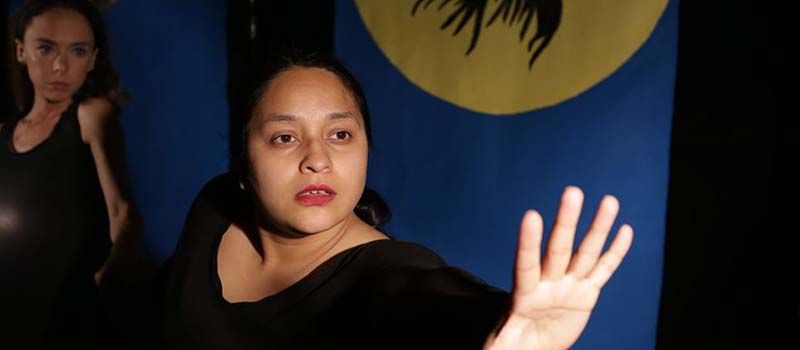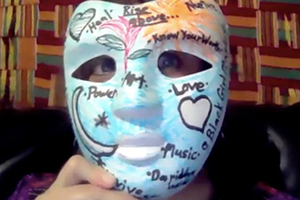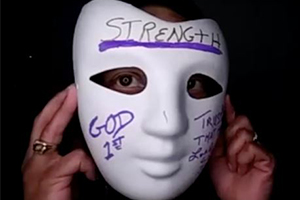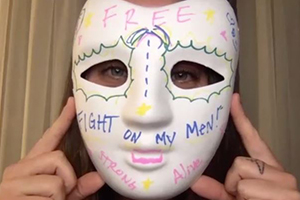Celebrating ‘beauty and resilience of the human spirit’ with Persephone Project

“Many years ago, I sat with a group of women at the Metropolitan Correctional Center in downtown Chicago. That evening, as part of our theater and writing class, we were talking about poetry. A woman across the table from me sat up a little straighter and said, ‘I’ve always wanted to write poetry.’ We began to write, and she composed her first poem:
‘I want to be like the water: clean, blue, desired and in all the parts of the world.’”
This memory is shared by Lisa Wagner-Carollo, founder and artistic director of Still Point Theatre Collective, an organization missioned to “use theater to raise consciousness on issues of peace and justice — and to celebrate the beauty and resilience of the human spirit. We see art as a basic human right, inherent to a healthy society.” The woman across the table was a participant in Still Point’s Persephone Project, a program for women who are currently incarcerated in Chicago, Illinois’ Cook County Jail and Metropolitan Correctional Center, as well as women who have been recently released from the Illinois Department of Corrections.
“The top priority of the Persephone Project is to give participants the tools to regain agency over their own lives and to move forward with a greater sense of identity and worth,” says Still Point Managing Director Clearie McCarthy. The women of Persephone Project who reside at Grace Transitional Home have literal license over their next chapters through financial compensation that they receive for writing, producing and performing their own original plays — remuneration supported in part by an FSPA grant.



Photos courtesy of Still Point Theatre Collective
Persephone Project performances not only allow participants to be “champions of their own narrative,” says Clearie, but also provide the opportunity for them to share with public audiences their first-person perspectives as women who’ve experienced incarceration. “Despite their enormous social significance, correctional facilities and the prison industrial complex at large remain obscured or invisible to many members of society,” says Clearie. “As more people hear these stories, the gap between women affected by the carceral system and those unaware of its impacts narrows.”
Since Still Point’s founding in 1993, “we’ve been blessed to receive a number of grants from the sisters to help with this work,” says Lisa. “I feel like we’ve grown together through the years.” She points to A Revolution of Goodness: FSPA’s proclamation of commitment to relationships, Gospel living and unity in diversity. “I’m deeply grateful that we are partners in this vision.”
The ministry grant that fuels this collaboration is sponsored by Franciscan Sister of Perpetual Adoration Linda Mershon. “The Persephone Project speaks to me because of the way it serves incarcerated and formerly incarcerated women, building confidence, tapping into their innate creativity, learning skills, networking with dynamic women and earning some income. It is an excellent new approach to helping women in the prison system, and I am very happy that FSPA can be a small part of it.”
To learn more about the organization, including its virtual adaptation of “The True Cost: Stories of Human Trafficking,” visit stillpointtheatrecollective.org.
Lisa and Clearie share personal reflections from two women of the Persephone Project
“The creative process can be intimidating, challenging and unfamiliar, but ultimately, it is incredibly rewarding. We have found that, when our theater workshops are over, joy, creative expression and positive communication carry on. We have seen the power of performance to shift dynamics between the women we work with and the institution staff.
“Teresa Lanehart has been coming to our program in Cook County Jail for months and is consistently warm and open. She says ‘The class is wonderful. We have a lot of groups, but this one takes me away. It’s life. No matter what the mood, theater class is new, it’s fun. This class makes us feel human. There can be a lot of hostility on the tier, but in theater class everything is left behind. Sometimes you might have two people get into an argument right before class, but once we get into our circle you would never even know that there was a problem. This class allows us to let our guard down because we’re in the moment and we realize: what do you have to lose to laugh?! It doesn’t make you feel stupid because it’s spontaneous, and we go back to the tier and teach the other women the games and exercises we learned that day.’
“Heather Rivett is an actor in the Grace House Transitional Home program who has now been a member of our Grace House ensemble for four years and has taken on a leadership position in the program. She shares that ‘my worst fear is speaking in front of any amount of people. I never wanted to tell my story but I tried the program because I wanted to learn how to tell my story in a different way, how to redirect my brain and not be so nervous. I’m still a nervous wreck when I speak in front of people but being able to tell my story to those who are so non-judgmental and give such genuine feedback is the best reward.”
